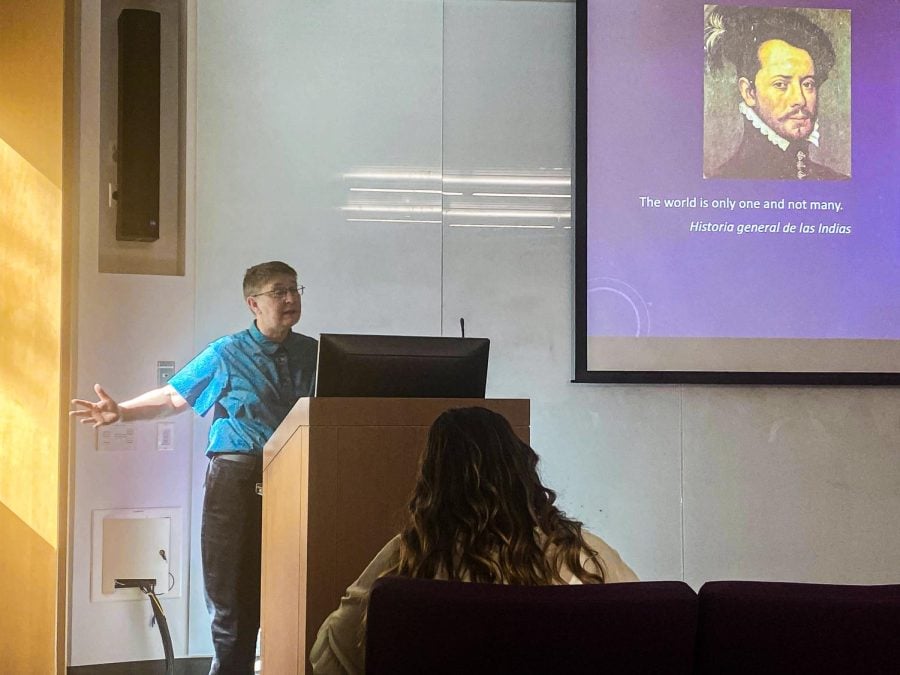Cornell Prof. Mary Pat Brady talks gentrification, colonization at Latinidad symposium
Samantha Powers/The Daily Northwestern
Author and Cornell Prof. Mary Pat Brady said in her keynote address on Latinidad that Latine authors face pressure from large publishing houses to pander to white audiences
May 12, 2023
Cornell University Prof. Mary Pat Brady gave a keynote address about gentrification and exploitation at Northwestern’s Latina and Latino Studies Program Spring Symposium Thursday.
The event launched a two-day conference titled “Urban Latinidades: Space, Place and Identity,” brought panelists from around the country to examine the identity and ethnography of Latinidad.
Brady teaches literature and Latina/o studies at Cornell, and she is the author of the books “Scales of Captivity: Racial Capitalism and the Latinx Child” and “Extinct Lands, Temporal Geographies: Chicana Literature and the Urgency of Space.”
During her lecture, Brady spoke about the 16th-century colonial origins of gentrification and labor exploitation in Latin America. She said because colonizers were better served by reducing Latine people to their market value, they would attempt to strip Latine people of individual identities and treat them as replaceable.
She connected this concept to the present-day stripping of identity from physical spaces through gentrification of Latine neighborhoods in major cities like New York, San Diego and Houston.
“Gentrification insists on the space being only about its market value, and not about the connections and lives and vibrant experiences and cultures that are in this place,” Brady said.
She said in her lecture that 16th-century European colonizers treated Latine people as replaceable to reduce their collective power. Now, in the United States, Brady said more and more Latine authors are writing anti-gentrification novels that aim to reclaim the complexities of Latine neighborhoods, communities and spaces.
“We are our families, and our schools, and our education, and the foods we consume and the dirt that we walk on,” Brady said. “We’re all those things, and to think of ourselves as multiple refuses the singularizing logic that markets depend on.”
Authors of anti-gentrification novels often face pressure from large publishing houses to pander to the white perspective, Brady added. This influence from the market serves to erase the diversity of the Latine identity, she said.
As a result of the power of big publishers, white consumers can engage with “palatable” gentrification narratives without participating in social movement-building. An example Brady gave was the widespread success of “American Dirt,” a 2020 novel about Mexican Migrants that made Oprah’s Book Club list, yet received criticism for its lack of authenticity.
Deisi Cuate, a Ph.D. candidate in Latinx studies, organized the symposium. She said she’d been inspired by her childhood in New York City, where she was surrounded by a diverse set of peers whose identities went beyond the simplicity of a racial category or ethnic label.
She said she continues to identify beyond the label of Latina today.
“Technically, yes, I am (Latina),” Cuate said. “But before I identify as Latina, I’m Mexican American. And before I identify as Mexican American, I’m a New Yorker.”
Brady thanked Cuate and other members of the Latina and Latino Studies Program for organizing the event. She said advancing an “underappreciated” field in academia takes commitment and fortitude.
African American Studies and Latina and Latino Studies Prof. John Márquez, director of the Latina and Latino Studies Program, said he hopes the spring symposium rebels against traditional methods of studying the Latine community, which often operate under colonial and controlling ideas.
“Our gente did not fight to gain access to universities so that they can learn how to be Latinos,” Márquez said. “They sought the knowledge of how to destroy this world and replace it with another.”
Email: [email protected]
Twitter: @sqpowers04
Related Stories:
— AASP, LLSP programs continue to push for department status
— Faculty Senate to vote on increasing Senate representation
— Anthropology, ethnic studies programs condemn Schapiro email


